Intercultural Communication Report: INCA Survey and Critical Incidents
VerifiedAdded on 2022/09/10
|6
|1941
|19
Report
AI Summary
This report presents an analysis of intercultural communication, focusing on the INCA (Intercultural Competency Assessment) survey and the application of its dimensions to critical incidents. The assignment begins with a self-assessment using the INCA survey, scoring oneself across six dimensions: Behavioral Flexibility, Knowledge Discovery, Communicative Awareness, Respect for Others, Tolerance for Ambiguity, and Empathy. The second part involves analyzing three critical incidents, framing each analysis using the INCA survey dimensions. The analysis incorporates scholarly references and is presented in a formal written paper using APA format, including headings for each section and subheadings for each critical incident. The report aims to demonstrate professional writing skills and enhance intercultural communication competency, providing a comprehensive understanding of cultural competence and its practical application through real-world scenarios. A chart or graph is included to support the written analysis.
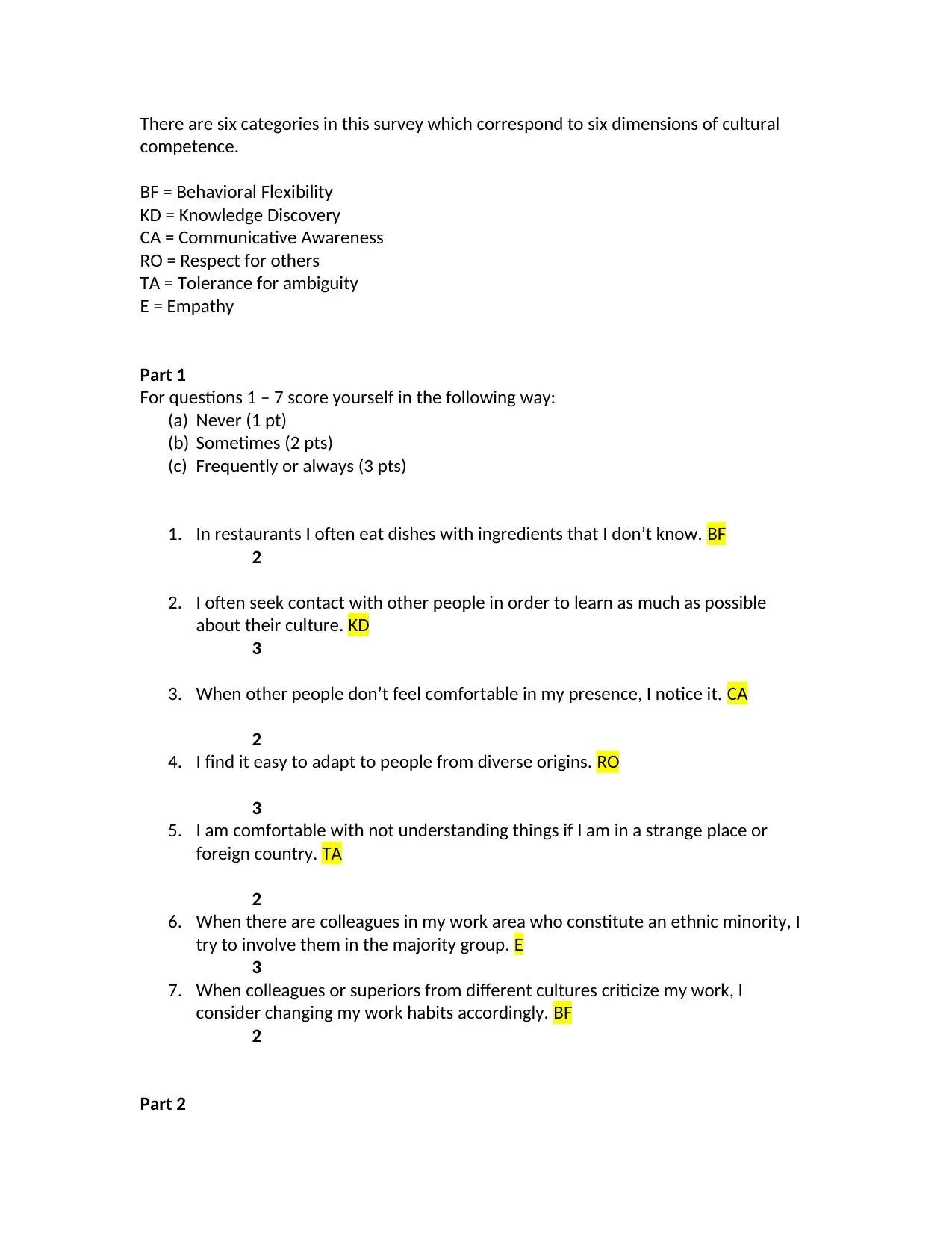
There are six categories in this survey which correspond to six dimensions of cultural
competence.
BF = Behavioral Flexibility
KD = Knowledge Discovery
CA = Communicative Awareness
RO = Respect for others
TA = Tolerance for ambiguity
E = Empathy
Part 1
For questions 1 – 7 score yourself in the following way:
(a) Never (1 pt)
(b) Sometimes (2 pts)
(c) Frequently or always (3 pts)
1. In restaurants I often eat dishes with ingredients that I don’t know. BF
2
2. I often seek contact with other people in order to learn as much as possible
about their culture. KD
3
3. When other people don’t feel comfortable in my presence, I notice it. CA
2
4. I find it easy to adapt to people from diverse origins. RO
3
5. I am comfortable with not understanding things if I am in a strange place or
foreign country. TA
2
6. When there are colleagues in my work area who constitute an ethnic minority, I
try to involve them in the majority group. E
3
7. When colleagues or superiors from different cultures criticize my work, I
consider changing my work habits accordingly. BF
2
Part 2
competence.
BF = Behavioral Flexibility
KD = Knowledge Discovery
CA = Communicative Awareness
RO = Respect for others
TA = Tolerance for ambiguity
E = Empathy
Part 1
For questions 1 – 7 score yourself in the following way:
(a) Never (1 pt)
(b) Sometimes (2 pts)
(c) Frequently or always (3 pts)
1. In restaurants I often eat dishes with ingredients that I don’t know. BF
2
2. I often seek contact with other people in order to learn as much as possible
about their culture. KD
3
3. When other people don’t feel comfortable in my presence, I notice it. CA
2
4. I find it easy to adapt to people from diverse origins. RO
3
5. I am comfortable with not understanding things if I am in a strange place or
foreign country. TA
2
6. When there are colleagues in my work area who constitute an ethnic minority, I
try to involve them in the majority group. E
3
7. When colleagues or superiors from different cultures criticize my work, I
consider changing my work habits accordingly. BF
2
Part 2
Paraphrase This Document
Need a fresh take? Get an instant paraphrase of this document with our AI Paraphraser
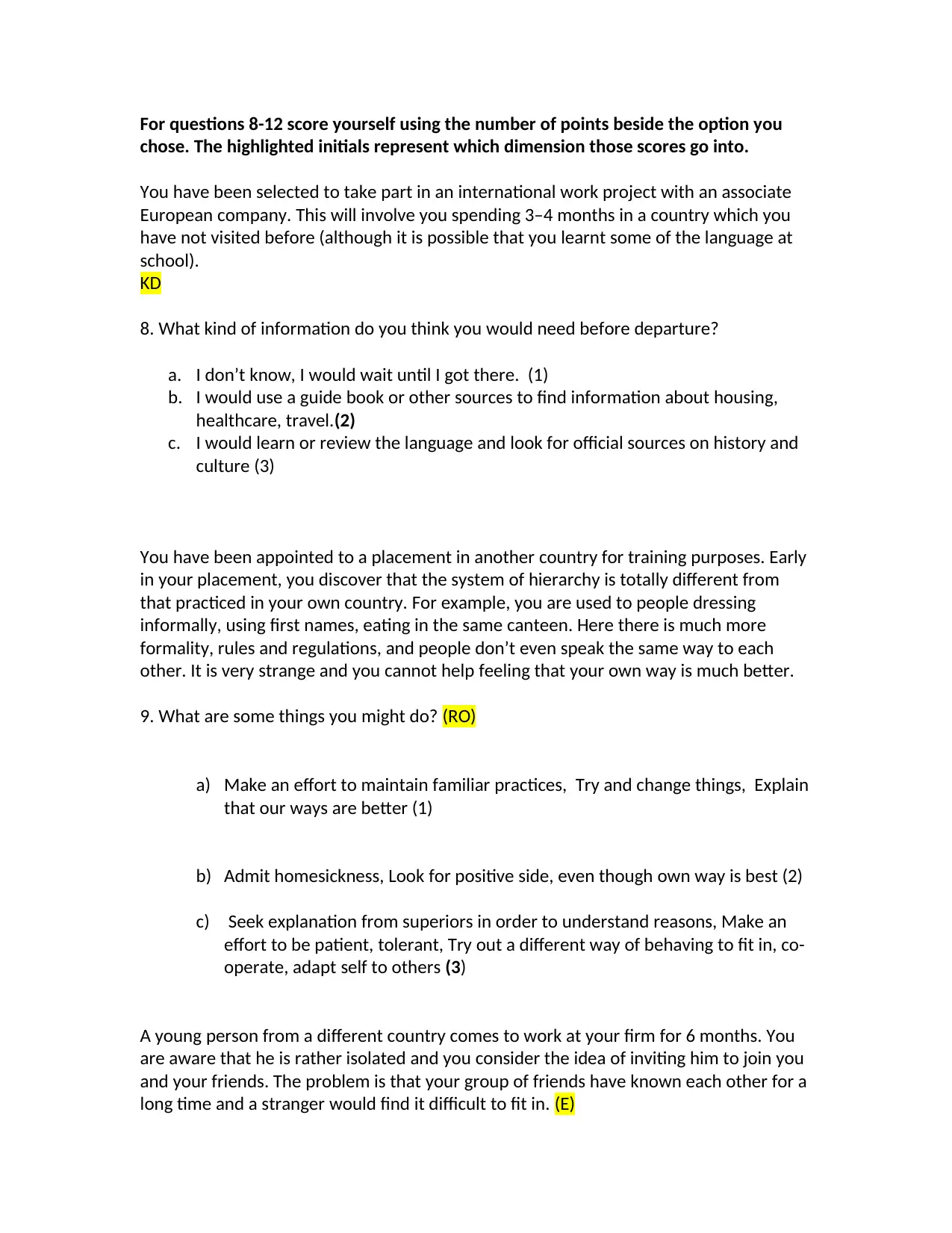
For questions 8-12 score yourself using the number of points beside the option you
chose. The highlighted initials represent which dimension those scores go into.
You have been selected to take part in an international work project with an associate
European company. This will involve you spending 3–4 months in a country which you
have not visited before (although it is possible that you learnt some of the language at
school).
KD
8. What kind of information do you think you would need before departure?
a. I don’t know, I would wait until I got there. (1)
b. I would use a guide book or other sources to find information about housing,
healthcare, travel.(2)
c. I would learn or review the language and look for official sources on history and
culture (3)
You have been appointed to a placement in another country for training purposes. Early
in your placement, you discover that the system of hierarchy is totally different from
that practiced in your own country. For example, you are used to people dressing
informally, using first names, eating in the same canteen. Here there is much more
formality, rules and regulations, and people don’t even speak the same way to each
other. It is very strange and you cannot help feeling that your own way is much better.
9. What are some things you might do? (RO)
a) Make an effort to maintain familiar practices, Try and change things, Explain
that our ways are better (1)
b) Admit homesickness, Look for positive side, even though own way is best (2)
c) Seek explanation from superiors in order to understand reasons, Make an
effort to be patient, tolerant, Try out a different way of behaving to fit in, co-
operate, adapt self to others (3)
A young person from a different country comes to work at your firm for 6 months. You
are aware that he is rather isolated and you consider the idea of inviting him to join you
and your friends. The problem is that your group of friends have known each other for a
long time and a stranger would find it difficult to fit in. (E)
chose. The highlighted initials represent which dimension those scores go into.
You have been selected to take part in an international work project with an associate
European company. This will involve you spending 3–4 months in a country which you
have not visited before (although it is possible that you learnt some of the language at
school).
KD
8. What kind of information do you think you would need before departure?
a. I don’t know, I would wait until I got there. (1)
b. I would use a guide book or other sources to find information about housing,
healthcare, travel.(2)
c. I would learn or review the language and look for official sources on history and
culture (3)
You have been appointed to a placement in another country for training purposes. Early
in your placement, you discover that the system of hierarchy is totally different from
that practiced in your own country. For example, you are used to people dressing
informally, using first names, eating in the same canteen. Here there is much more
formality, rules and regulations, and people don’t even speak the same way to each
other. It is very strange and you cannot help feeling that your own way is much better.
9. What are some things you might do? (RO)
a) Make an effort to maintain familiar practices, Try and change things, Explain
that our ways are better (1)
b) Admit homesickness, Look for positive side, even though own way is best (2)
c) Seek explanation from superiors in order to understand reasons, Make an
effort to be patient, tolerant, Try out a different way of behaving to fit in, co-
operate, adapt self to others (3)
A young person from a different country comes to work at your firm for 6 months. You
are aware that he is rather isolated and you consider the idea of inviting him to join you
and your friends. The problem is that your group of friends have known each other for a
long time and a stranger would find it difficult to fit in. (E)
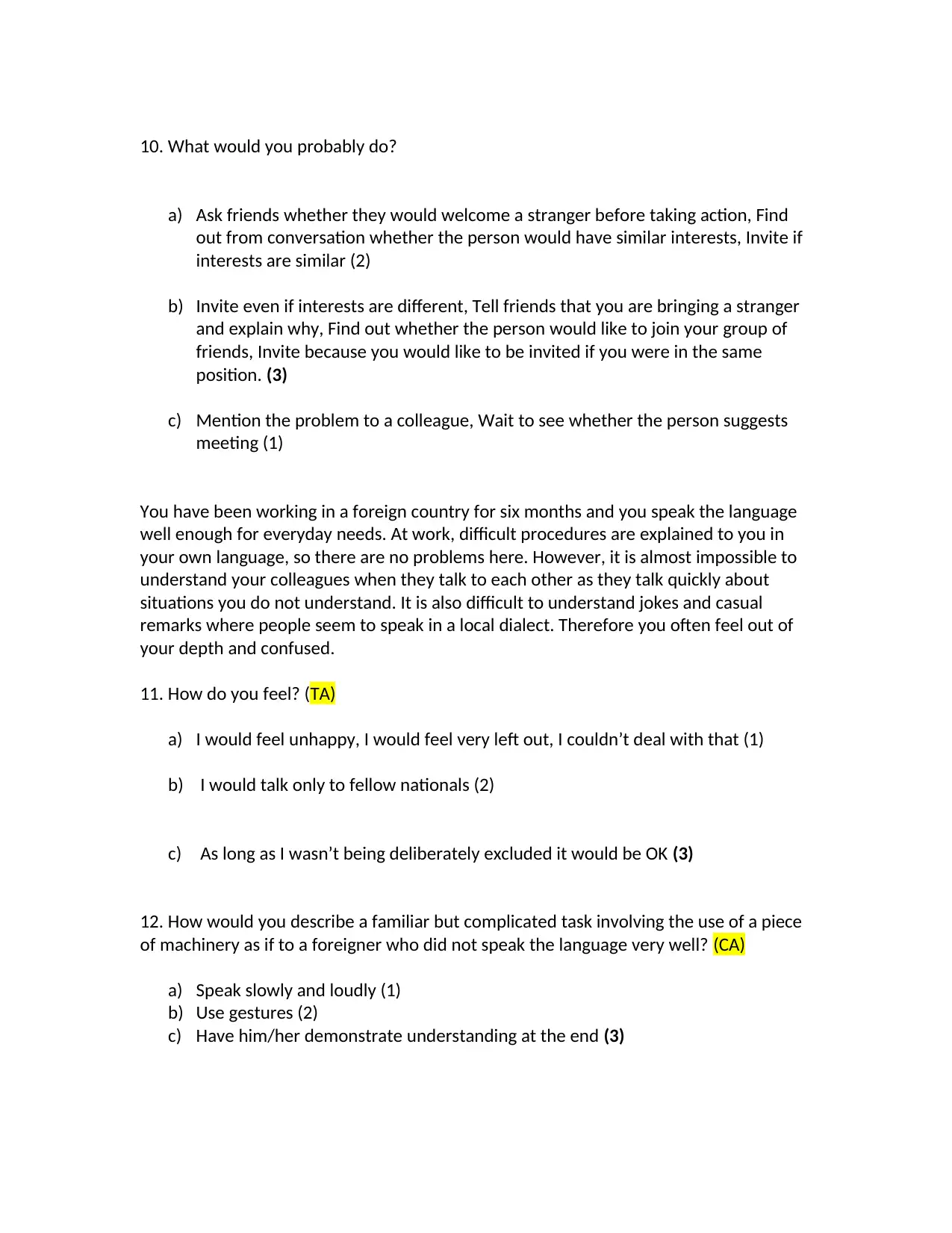
10. What would you probably do?
a) Ask friends whether they would welcome a stranger before taking action, Find
out from conversation whether the person would have similar interests, Invite if
interests are similar (2)
b) Invite even if interests are different, Tell friends that you are bringing a stranger
and explain why, Find out whether the person would like to join your group of
friends, Invite because you would like to be invited if you were in the same
position. (3)
c) Mention the problem to a colleague, Wait to see whether the person suggests
meeting (1)
You have been working in a foreign country for six months and you speak the language
well enough for everyday needs. At work, difficult procedures are explained to you in
your own language, so there are no problems here. However, it is almost impossible to
understand your colleagues when they talk to each other as they talk quickly about
situations you do not understand. It is also difficult to understand jokes and casual
remarks where people seem to speak in a local dialect. Therefore you often feel out of
your depth and confused.
11. How do you feel? (TA)
a) I would feel unhappy, I would feel very left out, I couldn’t deal with that (1)
b) I would talk only to fellow nationals (2)
c) As long as I wasn’t being deliberately excluded it would be OK (3)
12. How would you describe a familiar but complicated task involving the use of a piece
of machinery as if to a foreigner who did not speak the language very well? (CA)
a) Speak slowly and loudly (1)
b) Use gestures (2)
c) Have him/her demonstrate understanding at the end (3)
a) Ask friends whether they would welcome a stranger before taking action, Find
out from conversation whether the person would have similar interests, Invite if
interests are similar (2)
b) Invite even if interests are different, Tell friends that you are bringing a stranger
and explain why, Find out whether the person would like to join your group of
friends, Invite because you would like to be invited if you were in the same
position. (3)
c) Mention the problem to a colleague, Wait to see whether the person suggests
meeting (1)
You have been working in a foreign country for six months and you speak the language
well enough for everyday needs. At work, difficult procedures are explained to you in
your own language, so there are no problems here. However, it is almost impossible to
understand your colleagues when they talk to each other as they talk quickly about
situations you do not understand. It is also difficult to understand jokes and casual
remarks where people seem to speak in a local dialect. Therefore you often feel out of
your depth and confused.
11. How do you feel? (TA)
a) I would feel unhappy, I would feel very left out, I couldn’t deal with that (1)
b) I would talk only to fellow nationals (2)
c) As long as I wasn’t being deliberately excluded it would be OK (3)
12. How would you describe a familiar but complicated task involving the use of a piece
of machinery as if to a foreigner who did not speak the language very well? (CA)
a) Speak slowly and loudly (1)
b) Use gestures (2)
c) Have him/her demonstrate understanding at the end (3)
⊘ This is a preview!⊘
Do you want full access?
Subscribe today to unlock all pages.

Trusted by 1+ million students worldwide
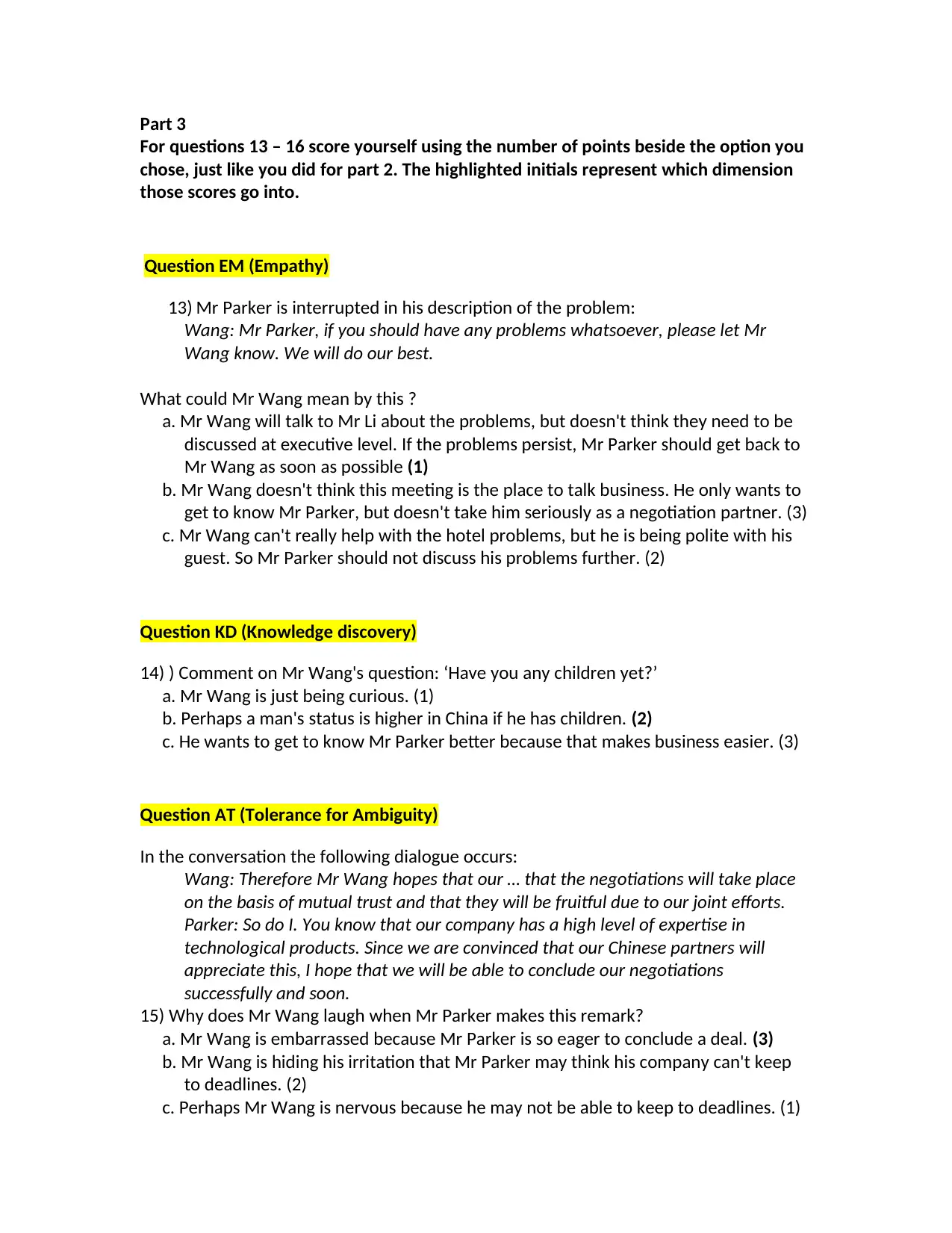
Part 3
For questions 13 – 16 score yourself using the number of points beside the option you
chose, just like you did for part 2. The highlighted initials represent which dimension
those scores go into.
Question EM (Empathy)
13) Mr Parker is interrupted in his description of the problem:
Wang: Mr Parker, if you should have any problems whatsoever, please let Mr
Wang know. We will do our best.
What could Mr Wang mean by this ?
a. Mr Wang will talk to Mr Li about the problems, but doesn't think they need to be
discussed at executive level. If the problems persist, Mr Parker should get back to
Mr Wang as soon as possible (1)
b. Mr Wang doesn't think this meeting is the place to talk business. He only wants to
get to know Mr Parker, but doesn't take him seriously as a negotiation partner. (3)
c. Mr Wang can't really help with the hotel problems, but he is being polite with his
guest. So Mr Parker should not discuss his problems further. (2)
Question KD (Knowledge discovery)
14) ) Comment on Mr Wang's question: ‘Have you any children yet?’
a. Mr Wang is just being curious. (1)
b. Perhaps a man's status is higher in China if he has children. (2)
c. He wants to get to know Mr Parker better because that makes business easier. (3)
Question AT (Tolerance for Ambiguity)
In the conversation the following dialogue occurs:
Wang: Therefore Mr Wang hopes that our … that the negotiations will take place
on the basis of mutual trust and that they will be fruitful due to our joint efforts.
Parker: So do I. You know that our company has a high level of expertise in
technological products. Since we are convinced that our Chinese partners will
appreciate this, I hope that we will be able to conclude our negotiations
successfully and soon.
15) Why does Mr Wang laugh when Mr Parker makes this remark?
a. Mr Wang is embarrassed because Mr Parker is so eager to conclude a deal. (3)
b. Mr Wang is hiding his irritation that Mr Parker may think his company can't keep
to deadlines. (2)
c. Perhaps Mr Wang is nervous because he may not be able to keep to deadlines. (1)
For questions 13 – 16 score yourself using the number of points beside the option you
chose, just like you did for part 2. The highlighted initials represent which dimension
those scores go into.
Question EM (Empathy)
13) Mr Parker is interrupted in his description of the problem:
Wang: Mr Parker, if you should have any problems whatsoever, please let Mr
Wang know. We will do our best.
What could Mr Wang mean by this ?
a. Mr Wang will talk to Mr Li about the problems, but doesn't think they need to be
discussed at executive level. If the problems persist, Mr Parker should get back to
Mr Wang as soon as possible (1)
b. Mr Wang doesn't think this meeting is the place to talk business. He only wants to
get to know Mr Parker, but doesn't take him seriously as a negotiation partner. (3)
c. Mr Wang can't really help with the hotel problems, but he is being polite with his
guest. So Mr Parker should not discuss his problems further. (2)
Question KD (Knowledge discovery)
14) ) Comment on Mr Wang's question: ‘Have you any children yet?’
a. Mr Wang is just being curious. (1)
b. Perhaps a man's status is higher in China if he has children. (2)
c. He wants to get to know Mr Parker better because that makes business easier. (3)
Question AT (Tolerance for Ambiguity)
In the conversation the following dialogue occurs:
Wang: Therefore Mr Wang hopes that our … that the negotiations will take place
on the basis of mutual trust and that they will be fruitful due to our joint efforts.
Parker: So do I. You know that our company has a high level of expertise in
technological products. Since we are convinced that our Chinese partners will
appreciate this, I hope that we will be able to conclude our negotiations
successfully and soon.
15) Why does Mr Wang laugh when Mr Parker makes this remark?
a. Mr Wang is embarrassed because Mr Parker is so eager to conclude a deal. (3)
b. Mr Wang is hiding his irritation that Mr Parker may think his company can't keep
to deadlines. (2)
c. Perhaps Mr Wang is nervous because he may not be able to keep to deadlines. (1)
Paraphrase This Document
Need a fresh take? Get an instant paraphrase of this document with our AI Paraphraser
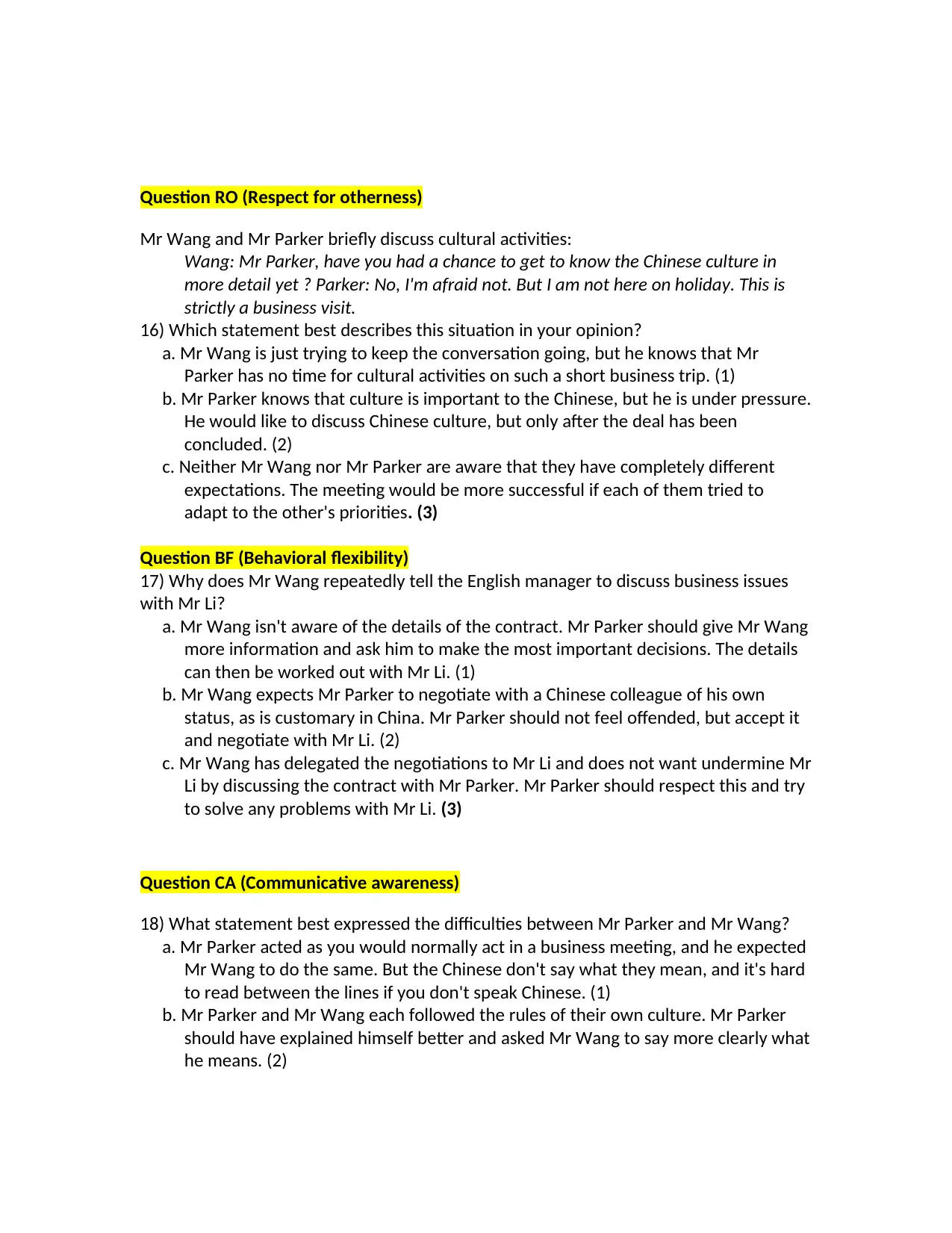
Question RO (Respect for otherness)
Mr Wang and Mr Parker briefly discuss cultural activities:
Wang: Mr Parker, have you had a chance to get to know the Chinese culture in
more detail yet ? Parker: No, I'm afraid not. But I am not here on holiday. This is
strictly a business visit.
16) Which statement best describes this situation in your opinion?
a. Mr Wang is just trying to keep the conversation going, but he knows that Mr
Parker has no time for cultural activities on such a short business trip. (1)
b. Mr Parker knows that culture is important to the Chinese, but he is under pressure.
He would like to discuss Chinese culture, but only after the deal has been
concluded. (2)
c. Neither Mr Wang nor Mr Parker are aware that they have completely different
expectations. The meeting would be more successful if each of them tried to
adapt to the other's priorities. (3)
Question BF (Behavioral flexibility)
17) Why does Mr Wang repeatedly tell the English manager to discuss business issues
with Mr Li?
a. Mr Wang isn't aware of the details of the contract. Mr Parker should give Mr Wang
more information and ask him to make the most important decisions. The details
can then be worked out with Mr Li. (1)
b. Mr Wang expects Mr Parker to negotiate with a Chinese colleague of his own
status, as is customary in China. Mr Parker should not feel offended, but accept it
and negotiate with Mr Li. (2)
c. Mr Wang has delegated the negotiations to Mr Li and does not want undermine Mr
Li by discussing the contract with Mr Parker. Mr Parker should respect this and try
to solve any problems with Mr Li. (3)
Question CA (Communicative awareness)
18) What statement best expressed the difficulties between Mr Parker and Mr Wang?
a. Mr Parker acted as you would normally act in a business meeting, and he expected
Mr Wang to do the same. But the Chinese don't say what they mean, and it's hard
to read between the lines if you don't speak Chinese. (1)
b. Mr Parker and Mr Wang each followed the rules of their own culture. Mr Parker
should have explained himself better and asked Mr Wang to say more clearly what
he means. (2)
Mr Wang and Mr Parker briefly discuss cultural activities:
Wang: Mr Parker, have you had a chance to get to know the Chinese culture in
more detail yet ? Parker: No, I'm afraid not. But I am not here on holiday. This is
strictly a business visit.
16) Which statement best describes this situation in your opinion?
a. Mr Wang is just trying to keep the conversation going, but he knows that Mr
Parker has no time for cultural activities on such a short business trip. (1)
b. Mr Parker knows that culture is important to the Chinese, but he is under pressure.
He would like to discuss Chinese culture, but only after the deal has been
concluded. (2)
c. Neither Mr Wang nor Mr Parker are aware that they have completely different
expectations. The meeting would be more successful if each of them tried to
adapt to the other's priorities. (3)
Question BF (Behavioral flexibility)
17) Why does Mr Wang repeatedly tell the English manager to discuss business issues
with Mr Li?
a. Mr Wang isn't aware of the details of the contract. Mr Parker should give Mr Wang
more information and ask him to make the most important decisions. The details
can then be worked out with Mr Li. (1)
b. Mr Wang expects Mr Parker to negotiate with a Chinese colleague of his own
status, as is customary in China. Mr Parker should not feel offended, but accept it
and negotiate with Mr Li. (2)
c. Mr Wang has delegated the negotiations to Mr Li and does not want undermine Mr
Li by discussing the contract with Mr Parker. Mr Parker should respect this and try
to solve any problems with Mr Li. (3)
Question CA (Communicative awareness)
18) What statement best expressed the difficulties between Mr Parker and Mr Wang?
a. Mr Parker acted as you would normally act in a business meeting, and he expected
Mr Wang to do the same. But the Chinese don't say what they mean, and it's hard
to read between the lines if you don't speak Chinese. (1)
b. Mr Parker and Mr Wang each followed the rules of their own culture. Mr Parker
should have explained himself better and asked Mr Wang to say more clearly what
he means. (2)

c. The different cultures are not a problem, but Mr Wang and Mr Parker should have
known that communication works differently in each culture. They should have
tried to talk about these differences instead of trying to talk business. (3)
known that communication works differently in each culture. They should have
tried to talk about these differences instead of trying to talk business. (3)
⊘ This is a preview!⊘
Do you want full access?
Subscribe today to unlock all pages.

Trusted by 1+ million students worldwide
1 out of 6
Your All-in-One AI-Powered Toolkit for Academic Success.
+13062052269
info@desklib.com
Available 24*7 on WhatsApp / Email
![[object Object]](/_next/static/media/star-bottom.7253800d.svg)
Unlock your academic potential
Copyright © 2020–2026 A2Z Services. All Rights Reserved. Developed and managed by ZUCOL.
